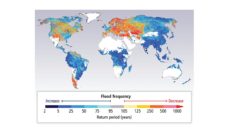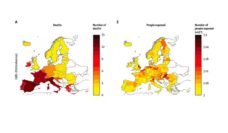Too often, climate change takes a backseat to the threats we face every day. For some, climate change is abstract, overwhelming, and perhaps best left for a future generation to address. And yet, according to a recent poll, 70% of Americans believe global warming is happening, up ten percentage points from March 2015.
Compared to 2015, more Americans cited direct experiences with extreme weather events, like hurricanes, flooding, and heat waves. Can experiencing these life-threatening events help explain why more Americans believe in climate change than ever before?
Previous research supports the idea that a newfound acceptance of climate change may occur after direct experience of its effects. The change is explained by the experience-perception link, where living through an extreme weather event makes climate change seem less abstract. In other words, a worst-case scenario suddenly is not so distant.
Opinions on climate change can evolve and may translate for some into environmentally-minded action.
Until recently, climate change studies analyzed the experience-perception link by asking about past experiences and past beliefs. New research assessed the link prospectively, by asking Floridians about their beliefs about climate change in the midst of hurricane season, before and after a storm. The pre-survey was administered just before Hurricane Irma made landfall. The historically damaging storm provided a direct experience for participants to reflect upon before completing the post-survey two weeks later.
Compared to pre-experience responses, participants felt stronger negative emotions, like fear, towards climate change after Hurricane Irma. In the post-survey, they were also more certain that Irma was caused by global warming than before.
The study also analyzed participants’ desire to take action. Compared to pre-Irma responses, after the storm participants felt higher taxes would be acceptable if proceeds benefitted the environment. Prior polling about the public’s thoughts on similar taxes has shown mixed results. Most Americans (57%) report willingness to pay $1 per month, but only 23% would pay up to $40 per month. Close to half (44%) support a tax on carbon-based fuels (one of the accelerants of climate change), with approval rising to two-thirds if the proceeds were reinvested towards environmental protection.
Magnus Bergquist, the lead author of the study, remains unsure of why the willingness to pay higher taxes changed. One possibility, he says, is that firsthand experience with extreme weather makes climate change seem more concrete. Irma’s danger might also have undermined respondents’ “unrealistically positive expectations” about their ability to survive major storms unscathed.
Opinions on climate change can evolve and may translate for some into environmentally-minded action.
Photo by Jonathan Ford on Unsplash














